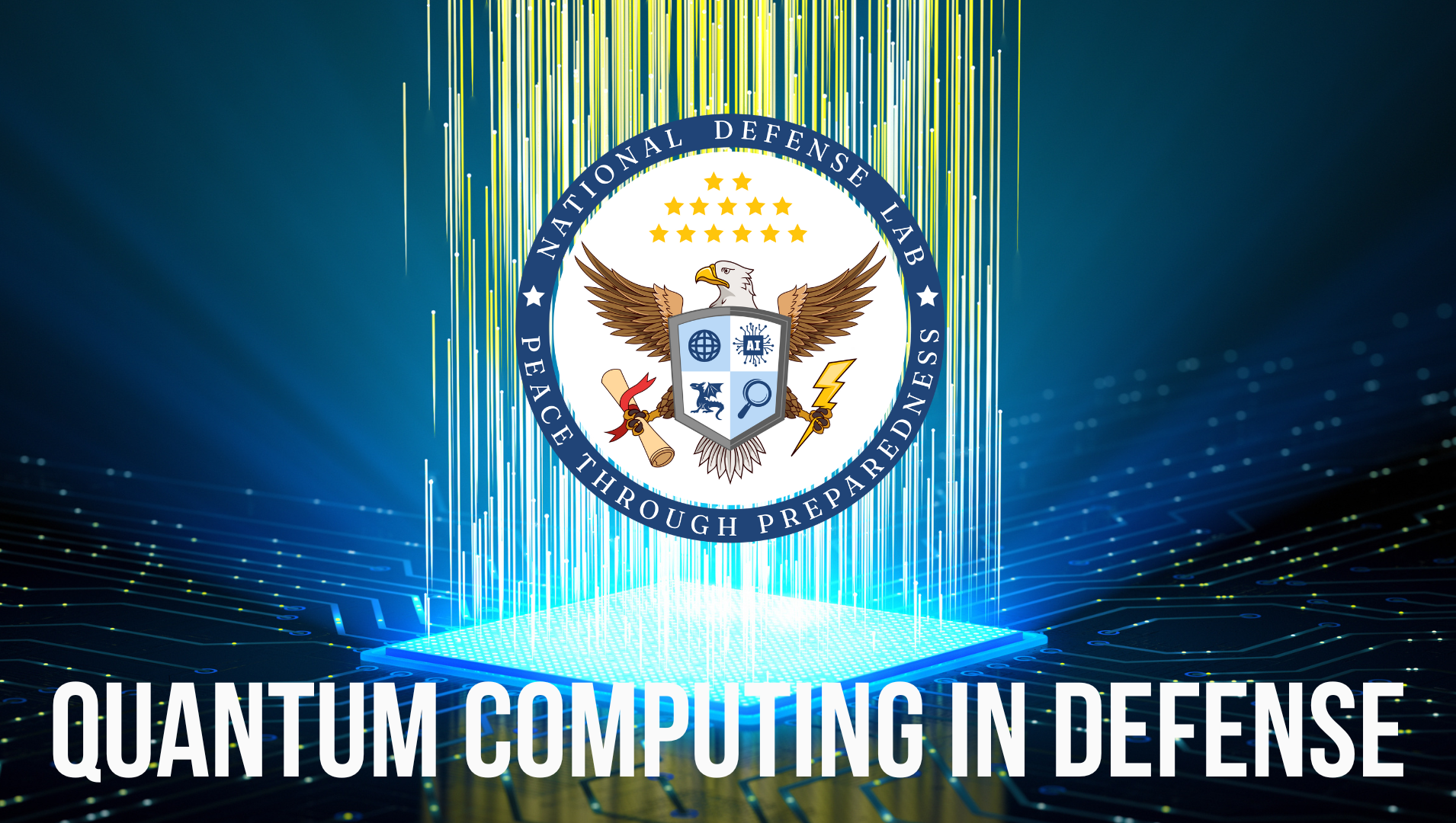Supercharge your defense operations with NDL solutions. Dive into a partnership that expands your team's cognitive reach. Ready to amplify your project's impact?
Quantum Computing in Defense: Transforming National Security with Advanced Technologies

Quantum computing is set to revolutionize the defense sector, bringing forth transformative capabilities that promise to reshape national security landscapes uniquely. As quantum technologies rapidly evolve at an unprecedented pace, defense organizations across the globe are increasingly attentive to their vast potential, recognizing how these leading-edge advancements can significantly enhance military operations and strategic advantages. Quantum computing defense applications, including advanced computing military strategies, quantum cryptography, and defense innovation, are far more than theoretical concepts; these applications are becoming essential components in the arsenal of modern military technology trends. This document will delve deeply into the profound impact of quantum computing on defense systems and national security technology, illustrating the strategic importance of embracing these robust innovations to maintain and secure a competitive edge in the dynamic and ever-evolving global defense arena.
Understanding Quantum Computing
Basics of Quantum Mechanics
Quantum mechanics is the cornerstone upon which quantum computing is built. It is a branch of physics that explores the strange and counterintuitive behaviors of particles at the atomic and subatomic levels. Unlike classical computing, which relies on bits that exist in a static state of either '0' or '1', quantum computing utilizes quantum bits, or qubits, which possess the unique ability to exist in multiple states simultaneously due to a property known as superposition. Another pivotal quantum property is entanglement, where qubits become so intricately interconnected that the state of one directly influences the state of another, regardless of the distance separating them. These phenomena enable quantum computers to process complex calculations at speeds previously thought unimaginable. Through these advanced mechanics, quantum computing defense strategies can harness monumental computational power, paving the way for groundbreaking advancements in cryptography and military technology trends. An in-depth understanding of these underlying principles is crucial for comprehending how quantum technology is poised to revolutionize national security technology with unprecedented innovations.
Key Capabilities for Defense
Quantum computing offers a wealth of transformative capabilities for defense sectors, setting the stage for unparalleled advancements in military technology trends. One of the primary applications lies in solving intricate optimization problems, which are vital for strategic military planning and efficient resource allocation. Quantum algorithms possess the astounding ability to process vast and complex datasets with unmatched efficiency, dramatically enhancing national security technology by enabling faster, more accurate analysis and predictions. Regarding cryptography, quantum computing introduces groundbreaking quantum cryptography methods that promise unbreakable encryption, effectively safeguarding sensitive military communications from potential cyber threats. Furthermore, quantum computing has the capacity to enhance real-time data processing, a critical component for intelligence, surveillance, and reconnaissance (ISR) operations, by facilitating quicker and more accurate threat detection. By harnessing the formidable power of quantum computing defense strategies, defense organizations stand to gain strategic advantages, significantly improving decision-making processes and operational efficiency. These capabilities highlight the vast potential of quantum technology to serve as a catalyst for defense innovation, driving a new era of advanced computing military applications. Embracing these technologies will be crucial for defense sectors aiming to maintain a decisive competitive edge in the modern global landscape.
National Security Technology and Quantum's Role
Quantum Computing's National Security Applications
Quantum computing holds immense potential for national security technology, offering innovative solutions to enhance defense capabilities across multiple dimensions. One prominent application lies in quantum cryptography, which leverages the fundamental principles of quantum mechanics to construct secure communication channels. This advanced method offers unparalleled protection against eavesdropping, crucial for securing the confidentiality of sensitive defense information in an increasingly digitalized world. Additionally, quantum computing has the power to revolutionize intelligence, surveillance, and reconnaissance (ISR) capabilities by processing vast amounts of data more efficiently than traditional classical systems, resulting in quicker and more precise identification of potential threats. This enhancement significantly bolsters situational awareness and improves response times during critical operations. Furthermore, quantum computing's unparalleled ability to solve complex optimization problems can optimally streamline military logistics, ensuring timely and effective deployment of resources during operations. By seamlessly integrating quantum technologies, defense organizations can achieve a strategic edge, drastically improving operational efficiency and bolstering overall security. These applications highlight the critical importance of investing in quantum computing defense initiatives as indispensable components in the ongoing evolution of military technology trends.
Enhancing Military Operations with Quantum Technology
Quantum technology offers significant advancements in enhancing military operations, providing a distinct strategic advantage in modern warfare scenarios. One key area of focus is optimizing logistics and supply chain management. Quantum computing possesses the unique ability to process and analyze data at unprecedented speeds, enabling real-time decision-making and highly efficient resource allocation, both critical for maintaining operational readiness in complex military environments. Moreover, quantum simulations can model intricate and dynamic scenarios, offering valuable insights into potential outcomes and aiding in the development of robust, adaptive strategies. This capability is particularly invaluable for mission planning and execution, where operational variables are highly dynamic and unpredictable. Additionally, advanced computing military applications utilizing quantum technology can markedly improve battlefield communications, ensuring secure, rapid transmission of vital information across units. By integrating quantum solutions, the defense sector can achieve higher levels of precision and effectiveness, aligning seamlessly with strategic defense innovation objectives. These enhancements underscore the transformative role of quantum computing in military technology trends, positioning defense organizations to navigate the complexities of modern security challenges effectively and efficiently.
The Race for Quantum Supremacy in Defense
Global Competition
The race for quantum supremacy in the defense sector has emerged as a focal point of intense international competition, with major global powers such as the United States and China investing heavily in quantum research and development initiatives. This global competition is spurred by the transformative potential of quantum computing to reshape strategic military capabilities and national security technology landscapes fundamentally. Both nations acknowledge that breakthroughs in quantum technology could redefine geopolitical power dynamics and influence global security for generations. The United States has prioritized quantum computing defense initiatives, aiming to secure and maintain its technological leadership in this rapidly advancing field. Similarly, China has made substantial investments in quantum research, seeking to leverage its potential military applications to strengthen its strategic position. Other countries are also actively entering the fray, recognizing that quantum advancements offer unprecedented opportunities for defense innovation and strategic advantages. This international race underscores the urgent necessity for nations to accelerate their quantum research efforts, ensuring they are not left behind in developing and deploying cutting-edge military technology trends. The outcome of this competition will likely influence global defense strategies and security alignments for decades to come.
Impact on Defense Innovation
The pursuit of quantum supremacy in defense holds profound implications for defense innovation, with the potential to transform the future landscape of military technology dramatically. As countries compete to harness the capabilities of quantum computing, they are driving a wave of technological advancements that could fundamentally redefine defense strategies worldwide. Quantum computing defense applications, including advanced simulations and pioneering cryptographic solutions, offer the promise of enhanced security and operational efficiency, thereby influencing traditional defense paradigms. This technological leap could shift the global balance of power, prompting defense organizations to rethink and modernize traditional approaches to national security technology. The integration of quantum innovations into military systems may lead to breakthroughs in diverse areas such as autonomous systems, materials science, and advanced communications networks. As these technologies mature and become more widely integrated, they will likely accelerate the pace of defense innovation, offering strategic advantages to nations that successfully incorporate quantum solutions into their military operations. Ultimately, the race for quantum supremacy is not solely about achieving technological leadership but also about redefining how defense organizations approach security and innovation in an increasingly complex and interconnected global arena.
Implementing Quantum Computing
At National Defense Lab, we are integrating quantum computing across our ventures, including Athena AI, NetNosis, Stellar, and others. These groundbreaking technologies enhance our AI-driven solutions, cybersecurity capabilities, and space warfare strategies, positioning us at the forefront of defense innovation. By leveraging quantum computing, we are unlocking new potentials for data processing, encryption, and decision-making to secure strategic advantages. If you're looking to implement quantum computing in your operations, reach out to us—we’re here to help guide your journey into this transformative technology.
Contact us today to explore quantum solutions for your venture!



